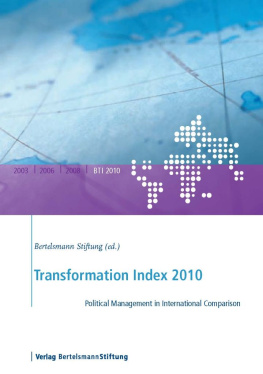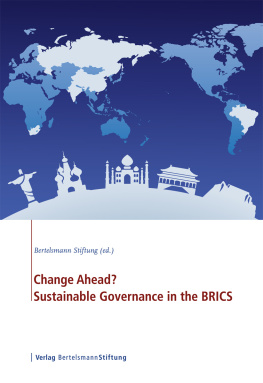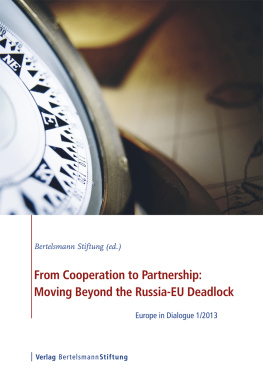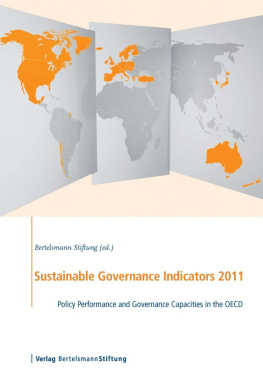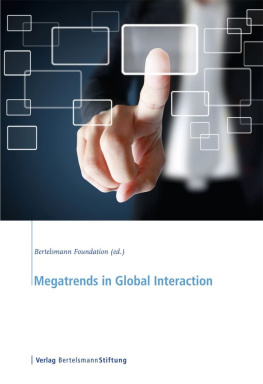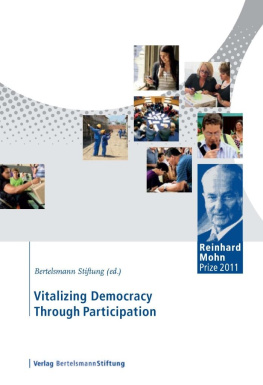Bibliographic information published by Die Deutsche Nationalbibliothek
Die Deutsche Nationalbibliothek lists this publication in the
Deutsche Nationalbibliografie; detailed bibliographic information
is available online at http://dnb.d-nb.de.
2010 E-Book-Ausgabe (EPUB)
2010 Verlag Bertelsmann Stiftung, Gtersloh
Managing editor: Olaf Hillenbrand
Copy editor: Celia Bohannon, Vermont
Production editor: Christiane Raffel
Translation: Barbara Serfozo, Berlin
Cover design: Nadine Humann
Cover illustration: Getty Images; Kopfstand GbR, Bielefeld
Typesetting and print: Hans Kock Buch- und Offsetdruck GmbH, Bielefeld
ISBN : 978-3-86793-277-6
www.bertelsmann-stiftung.org/publications
www.bertelsmann-stiftung.de/verlag
Inhaltsverzeichnis
Preface
The capacity to shape social change is crucial to any states ability to manage the challenges of economic development and political transformation. These challenges are increasingly interlinked, with decisions made in developing countries and in nations undergoing transformation now resonating far beyond their borders and vice versa. Successful transitions to democracy and to market economic systems-or failures in this regard-today have profound consequences for security issues, growth opportunities and cooperation efforts in the so-called first world. Political decision-makers vision and aptitude in shaping change have direct and tangible global impact on a transnational scale. But if the stakes are higher today, the means for making informed decisions are expanding apace. Reformers can draw on the experiences of others who are facing or who have faced similar challenges. These experiences constitute an invaluable learning opportunity. As a tool facilitating an exchange of good practices, the Transformation Index (BTI) of the Bertelsmann Stiftung has provided precisely this kind of opportunity since May 2004.
Using an established classification system and uniform standards, the Transformation Index 2010 assesses transformation policy in 128 countries, monitoring in each the state of democratic and market economic transformation as of the spring of 2009. The Index focuses on the actions of governments and agents of reform as well as the ability of both to shape change in the period from 2007 to 2009. The BTI 2010s diverse findings are explored from various points of view in this volumes contributions.
Chapter I draws interim conclusions regarding the scope and impact of the Transformation Index and-given the global financial and economic crisis that broke on developing and transformation countries shores at the start of 2009-identifies the BTI 2010 survey period as the end of an era of considerable opportunity for these countries.
Chapter II provides a summary of and quick access to this editions key findings. This chapter primarily interprets the projects aggregated results. It also provides an introduction to the BTIs objectives and explores individual country rankings in the Status Index and Management Index.
Chapter III,Global Trends, offers an in-depth look at the BTI results in global comparison. This analysis draws on the knowledge of seven regional and 128 national experts to examine the key factors of good governance and identifies conditions for successful transformation and reform management.
Chapter IV focuses on defective democracies as a relevant issue in foreign, security and development policy. Seventy-six of the 128 states surveyed are classified as democracies, of which only 23 are considered to be undergoing consolidation. The majority of states classified as democracies suffer from deficits that threaten to undermine the acceptance and performance of democratic institutions, in some cases severely so. Although the conduct of elections in these countries is considered to be reasonably free and fair, their quality of democracy has in many cases deteriorated substantially. In some countries, such as Venezuela, governing regimes have even reverted to authoritarian forms of leadership. BTI findings are used in this chapter to establish a typology of democratic deficits and to investigate their root causes.
Chapter V explains in detail the criteria and methodology underlying the BTI 2010 and positions the Transformation Index within the landscape of international surveys that address similar issues.
Chapter VI consists of seven regional reports, including East-Central and Southeast Europe, the CIS and Mongolia, the Middle East and North Africa, West and Central Africa, South and East Africa, Asia and Oceania, and Latin America and the Caribbean. In each report, the respective BTI regional coordinator provides in-depth assessments of the quality of democracy, the state of economic development and the governance of leaders in various regions around the globe.
The volume also includes an overview of the full BTI rankings in the form of a chart and a CD-ROM containing the individual country reports, the Transformation Atlas, the complete set of scores assigned to each country and, in the interest of transparency, all materials used in the process of creating the country reports.
A large body of data such as that collected by the Transformation Index is essential if we are to properly compare processes of transformation and competently pursue research questions related to issues of transformation. The assessments and data collected afford users a rich opportunity to explore the state of transformation in the world to an extent otherwise impossible. This can range from comparing individual countries with one another, to comparing regions, to comparing factors of success in development and transformation, to pursuing thematic interests, such as the rule of law, as they manifest themselves in a variety of ways.
It is especially this depth of focus that has made the Transformation Index of the Bertelsmann Stiftung the worlds foremost index of systematically compared transformation processes. To date, several governments, including those of Germany, the United Kingdom, the Netherlands and the United States, use it as a reference tool in crafting their development policies. International organizations, such as the World Bank, the European Commission and Transparency International, have also come to rely on the Transformation Index in their own work. Unequaled in its focus on assessing political leaders steering performance, the BTI has sparked demand for feasible, practical suggestions that address good practices for shaping change. In the future, we will be addressing this challenge by increasing our focus on the quality of political management and the ability to overcome crises.
The fact that the Transformation Index enjoys widespread popularity among policymakers and the public, attracting considerable interest for the Bertelsmann Stiftung in its international work, is due in large part to the combined efforts of numerous people around the world. For their cooperation and commitment, we would like to take this opportunity to express our sincere gratitude.
The projects quality stands or falls with the quality and validity of the country reports, which constitute the backbone of all our assessments and scores. We are as happy as we are proud to be able to rely on an invaluable network of more than 250 experts at top academic institutions around the globe, and we extend our heartfelt thanks to all of those individuals who have contributed their expertise.
At the operational heart of the Transformation Index, the regional coordinators not only monitor and guide the process of creating the country reports, but also play a major role in calibrating the results, both within their respective regions and in interregional comparisons. In addition to their dedication at the operational level, they have also provided contributions to this volume in the form of regional reports. We would like to thank Matthias Basedau, Martin Brusis, Aurel Croissant, Bernd Kuzmits, Siegmar Schmidt, Peter Thiery and Jan Vlkel for their outstanding work. Special thanks go to Olaf Hillenbrand, who, as deputy director of the Research Group on the Global Future at the Center for Applied Policy Research, was essential in coordinating the process of collecting and assessing the results and who, with the energetic support of Anna Katharina Naab, provided editorial support in producing this volume.


